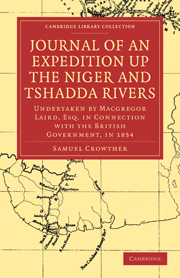 Journal of an Expedition up the Niger and Tshadda Rivers
Journal of an Expedition up the Niger and Tshadda Rivers Book contents
Summary
October 2. The labour of getting the ship afloat, was resumed with the united efforts and assistance of Mr. May and Dr. Baikie; and to the joy of us all, our object was effected about three p.m.; the continued rising of the water greatly assisting us. At noon, a canoe was seen pulling up, and stopping among the grass to look at us; she was hailed alongside: she came from Zhibu, about twenty miles below us, and had on board as passengers, two Haussa traders, men of Bautshi, who were returning from Zhibu with two slaves and some ivory which they had purchased. The ivory was bought from them in exchange for cowries and some goods; the slaves sat in the canoe unshackled, as there was no chance of their escape when travelling on the river, but they had on board the irons to secure them, two pairs of which were purchased by Dr. Baikie. The canoe had to pass the night among the bushes, because there were no villages near the water-side for them to put in. I asked about the population of this part of the country, and was told that from Zhibu to the Akam, or Kankundi river, and five day's journey inland from Zhibu, no human habitation is to be found. I asked, what had become of the inhabitants? They replied, they had all been carried away captives to Sokoto.
- Type
- Chapter
- Information
- Journal of an Expedition up the Niger and Tshadda RiversUndertaken by Macgregor Laird, Esq. in Connection with the British Government, in 1854, pp. 127 - 160Publisher: Cambridge University PressPrint publication year: 2010First published in: 1855
